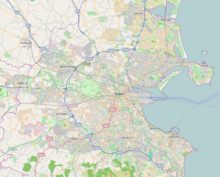Kenilworth Square
 A vista along North Kenilworth Square | |
| Native name | Cearnóg Kenilworth (Irish) |
|---|---|
| Namesake | Kenilworth (novel)[1] |
| Area | 3.0 hectares (7.4 acres) |
| Location | Rathmines, Dublin, Ireland |
| Postal code | D06 |
| Coordinates | 53°19′6″N 6°16′33.16″W / 53.31833°N 6.2758778°W |
Kenilworth Square is a Victorian square in the Rathgar area of Dublin 6, Ireland. It was developed by several different developers between 1858 and 1879. [2][3] The houses are in a variety of different styles although all are finished in red brick.
History
[edit]The Ordnance Survey map of 1867 shows that most plots surrounding the square had already been laid out and built upon at that stage. Development of the surrounding area had begun initially after the establishment of the township of Rathgar and Rathmines in 1847.
St Mary's College privately own the green area inside the square which they acquired in 1947 from a property developer named Mr White. The developer had originally acquired the interest of a majority of home owners in the square.
This area contains three rugby pitches which is converted to a cricket pitch in the summer months as well as some changing rooms.[4]
Kenilworth bowling club was established in the square in 1892 in the back garden of Charles Eason, founder of Eason & Son at 29 and 30 Kenilworth Square. The club acquired a 25-year lease on nearby Grosvenor Square in 1909 and have remained there ever since despite retaining the Kenilworth name.[5]
1999 Private key access
[edit]In 1999, Judge John O'Hagan ruled that a group of residents were not entitled to a permanent right of way or access to a private key for the park based on previous licence agreements with owners stretching back to 1860 as there was no current contractual agreement in place.[6]
2024 Redevelopment plans
[edit]In 2024, St Mary's school revealed plans to redevelop the square, removing one of the pitches to create two larger pitches on the square with one being an all weather rugby pitch. They also planned to demolish the existing changing rooms and construct a new larger set of changing rooms as well as modern floodlights and a carpark.[7] Locals, conservationists and environmentalists have raised concerns about the impact to the environment and community as well as the proposed commercialisation of the square.[8]
Notable residents
[edit]- Ludwig Hopf, German-Jewish theoretical physicist - lived at number 65.[9]
- Pádraig MacKernan lived at number 22.
References
[edit]- ^ Daly, Mary E.; Hearn, Mona; Pearson, Peter (12 March 1998). Dublin's Victorian houses. A. & A. Farmar. ISBN 9781899047420 – via Google Books.
- ^ "1 Waverley Terrace, Dublin 6 - Architectural Heritage Impact Assessment" (PDF). www.dublincity.ie. 31 December 2019. Retrieved 31 December 2019.
- ^ Burns, Alan. "Architectural Heritage Impact Assessment - 32 Kenilworth Square West" (PDF). dublincity.ie. Dublin City Council. Retrieved 3 June 2020.
- ^ "HISTORY OF CRICKET IN ST. MARY'S COLLEGE". www.stmarys.ie. 2 January 2020. Retrieved 2 January 2020.
- ^ "Kenilworth Bowling Club - A Little History". www.kenilworthbc.ie. 3 January 2020. Retrieved 3 January 2020.
- ^ "Rathgar residents lose case over access to park". The Irish Times. Retrieved 24 June 2024.
- ^ "Project Kenilworth". Project Kenilworth. Retrieved 28 May 2024.
- ^ "Proposed Redevelopment of Kenilworth Square by St Mary's College, Rathmines". Protect Kenilworth Square. Retrieved 4 July 2024.
- ^ Comerford, Patrick. "Ludwig Hopf, one of 'the greatest geniuses of his time' and his short exile in Rathgar". Retrieved 13 January 2021.

